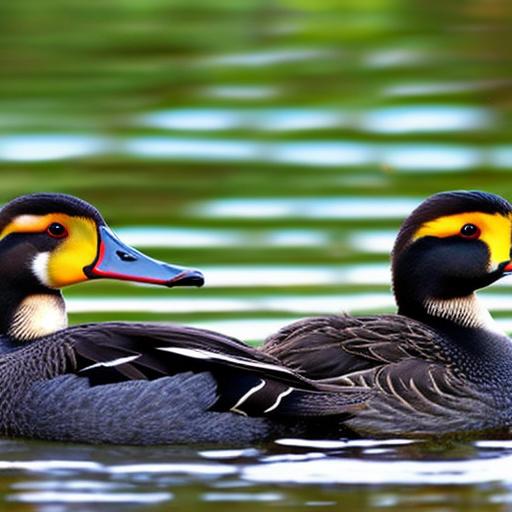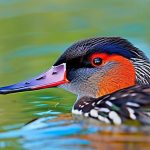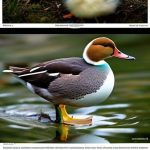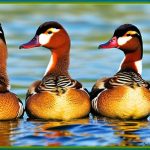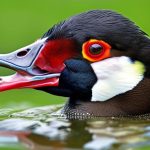Domestic black duck breeds are a popular choice for farmers and breeders due to their versatility and adaptability. These ducks are known for their dark plumage, which ranges from a deep black to a dark gray. They are often raised for their meat, eggs, and feathers, making them an important part of agriculture and farming.
Key Takeaways
- Domestic black duck breeds are a popular choice for backyard farming and as pets.
- Physical characteristics of domestic black ducks include a black plumage, orange feet, and a green or purple iridescence on their heads.
- Domestic black ducks have a long history, with some breeds originating in Europe and others in Asia.
- Popular domestic black duck breeds include the Cayuga, Black Swedish, and Indian Runner.
- Best practices for breeding and rearing domestic black ducks include providing a clean and safe environment, proper nutrition, and regular health checks.
Physical Characteristics of Domestic Black Duck Breeds
Domestic black ducks come in various sizes and weights, depending on the breed. The Cayuga duck, for example, is a medium-sized breed that weighs around 6-8 pounds. On the other hand, the Indian Runner duck is a lightweight breed that weighs only 3-5 pounds. Despite these differences, all domestic black ducks share the common characteristic of having dark plumage.
Each breed also has its own unique features. The Cayuga duck, for instance, has a greenish-black plumage that shimmers in the sunlight. It also has a small crest on its head and orange or brown eyes. The Indian Runner duck, on the other hand, has an upright stance and a long, slender body. Its name comes from its distinctive running gait, which is more like a penguin waddle.
History and Origin of Domestic Black Duck Breeds
Domestic black ducks have evolved from their wild counterparts through selective breeding over centuries. The process of domestication began when humans started to capture and raise wild ducks for their meat and eggs. Over time, certain traits were favored and passed down through generations, resulting in the development of distinct domestic breeds.
The historical significance of domestic black ducks cannot be overstated. They have been an important source of food and income for many communities throughout history. In addition to their meat and eggs, their feathers have been used for various purposes such as insulation, bedding material, and even fashion accessories.
Popular Domestic Black Duck Breeds: An Overview
There are several popular domestic black duck breeds, each with its own unique characteristics. The Cayuga duck is one of the most well-known breeds. It is prized for its flavorful meat and beautiful plumage. The Indian Runner duck, as mentioned earlier, is known for its distinctive running gait and high egg production. The Black Swedish duck, on the other hand, is a large breed that is often raised for both meat and eggs.
Each breed has its own set of characteristics that make it unique. For example, the Cayuga duck is known for its calm and friendly temperament, making it a popular choice for backyard flocks. The Indian Runner duck, on the other hand, is highly active and has a curious nature. It is also known for its ability to lay a large number of eggs.
Breeding and Rearing Domestic Black Ducks: Best Practices
Breeding domestic black ducks requires careful planning and attention to detail. It is important to select healthy breeding stock with desirable traits. Ducks should be paired based on their breed characteristics and genetic diversity to ensure strong offspring.
When it comes to hatching ducklings, it is best to use an incubator or a broody duck. Incubators provide a controlled environment for optimal hatching conditions, while broody ducks can provide natural warmth and care. It is important to monitor the temperature and humidity levels during the incubation period to ensure successful hatching.
Rearing ducklings requires proper feeding, housing, and care. Ducklings should be provided with a balanced diet that includes a mix of commercial duck feed and fresh greens. They should also have access to clean water at all times. Housing should be spacious enough to allow for exercise and should provide protection from predators and extreme weather conditions.
Housing and Feeding Domestic Black Ducks: A Guide
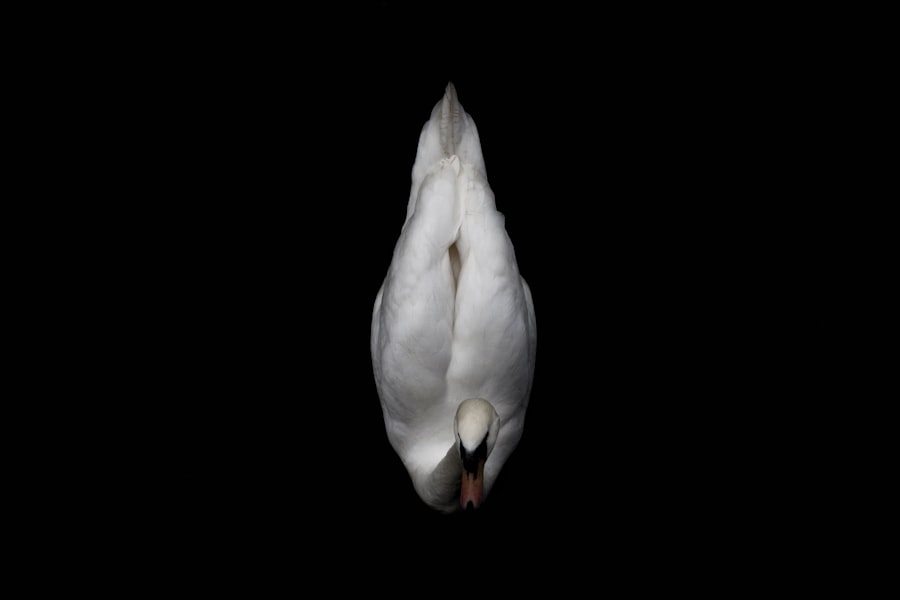
Domestic black ducks require appropriate housing to ensure their health and well-being. A duck coop or a shed with proper ventilation and insulation is essential. The coop should be spacious enough to allow for natural behaviors such as swimming and foraging. It should also have nesting boxes for egg-laying ducks.
Feeding domestic black ducks requires a balanced diet that meets their nutritional needs. A combination of commercial duck feed and fresh greens is recommended. Ducks also enjoy foraging for insects and worms, so providing access to a grassy area or a pond can be beneficial.
Health Concerns and Common Diseases in Domestic Black Ducks
Like any other livestock, domestic black ducks are susceptible to various health issues and diseases. Common health concerns include respiratory infections, parasites, and foot problems. It is important to provide regular veterinary care and vaccinations to prevent the spread of diseases.
Prevention is key when it comes to maintaining the health of domestic black ducks. Proper sanitation practices, such as regular cleaning of the coop and providing clean water, can help prevent the spread of diseases. Quarantining new birds before introducing them to the flock can also help prevent the introduction of diseases.
Domestic Black Ducks as Pets: Pros and Cons
Keeping domestic black ducks as pets can be a rewarding experience, but it also comes with its own set of challenges. One advantage of keeping ducks as pets is their friendly and sociable nature. They can form strong bonds with their owners and provide companionship.
However, there are also disadvantages to consider. Ducks require a significant amount of space and can be messy. They produce a large amount of waste, which needs to be managed properly. Additionally, ducks are prone to noise, especially during mating season.
Domestic Black Ducks in Agriculture and Farming: Benefits and Challenges
Domestic black ducks play a crucial role in agriculture and farming. They are valued for their meat, eggs, feathers, and even their manure, which can be used as fertilizer. They are also excellent foragers and can help control pests in gardens and fields.
However, there are challenges faced by farmers and breeders when it comes to raising domestic black ducks. Predators, such as foxes and raccoons, can pose a threat to the ducks. Proper fencing and predator deterrents are necessary to protect the flock. Additionally, ducks require a significant amount of space and can be labor-intensive to care for.
Future of Domestic Black Duck Breeds: Opportunities and Threats
The future of domestic black duck breeds holds both opportunities and threats. There is a growing demand for locally sourced and sustainable food, which presents an opportunity for farmers and breeders to market their products. The unique characteristics of domestic black ducks, such as their flavorful meat and high egg production, make them an attractive choice for consumers.
However, there are also threats to the survival of domestic black ducks. Loss of habitat, pollution, and climate change can all have a negative impact on their populations. Conservation efforts, such as habitat restoration and captive breeding programs, are important for the long-term survival of these breeds.
In conclusion, domestic black duck breeds are an important part of agriculture and farming. They provide valuable resources such as meat, eggs, feathers, and manure. Their unique characteristics make them versatile and adaptable to various farming systems. It is important to continue learning about domestic black ducks and their importance in order to ensure their survival for future generations.
If you’re interested in black duck breeds for domestic purposes, you might also find this article on Poultry Wizard helpful. It provides valuable information on how to build a chicken coop in Grand Island, NE, which is essential for creating a comfortable and safe environment for your ducks. Check it out here.
FAQs
What are black duck breeds?
Black duck breeds are domesticated ducks that have black feathers. They are commonly raised for their meat, eggs, and feathers.
What are some common black duck breeds?
Some common black duck breeds include the Black Swedish, Cayuga, and Indian Runner.
What is the size of black duck breeds?
Black duck breeds vary in size depending on the breed. The Black Swedish can weigh up to 7 pounds, while the Indian Runner typically weighs around 4 pounds.
What is the lifespan of black duck breeds?
The lifespan of black duck breeds can vary depending on the breed and how well they are cared for. On average, domesticated ducks can live up to 10 years.
What is the temperament of black duck breeds?
Black duck breeds are generally docile and friendly. They can make good pets and are often used for their eggs and meat.
What is the diet of black duck breeds?
Black duck breeds are omnivores and eat a variety of foods including insects, plants, and small animals. They can also be fed commercial duck feed.
What is the breeding season for black duck breeds?
The breeding season for black duck breeds can vary depending on the breed and location. Generally, breeding season occurs in the spring and summer months.
What is the incubation period for black duck breeds?
The incubation period for black duck breeds is typically around 28 days. During this time, the female duck will sit on her eggs to keep them warm and help them hatch.
Meet Walter, the feathered-friend fanatic of Florida! Nestled in the sunshine state, Walter struts through life with his feathered companions, clucking his way to happiness. With a coop that’s fancier than a five-star hotel, he’s the Don Juan of the chicken world. When he’s not teaching his hens to do the cha-cha, you’ll find him in a heated debate with his prized rooster, Sir Clucks-a-Lot. Walter’s poultry passion is no yolk; he’s the sunny-side-up guy you never knew you needed in your flock of friends!

